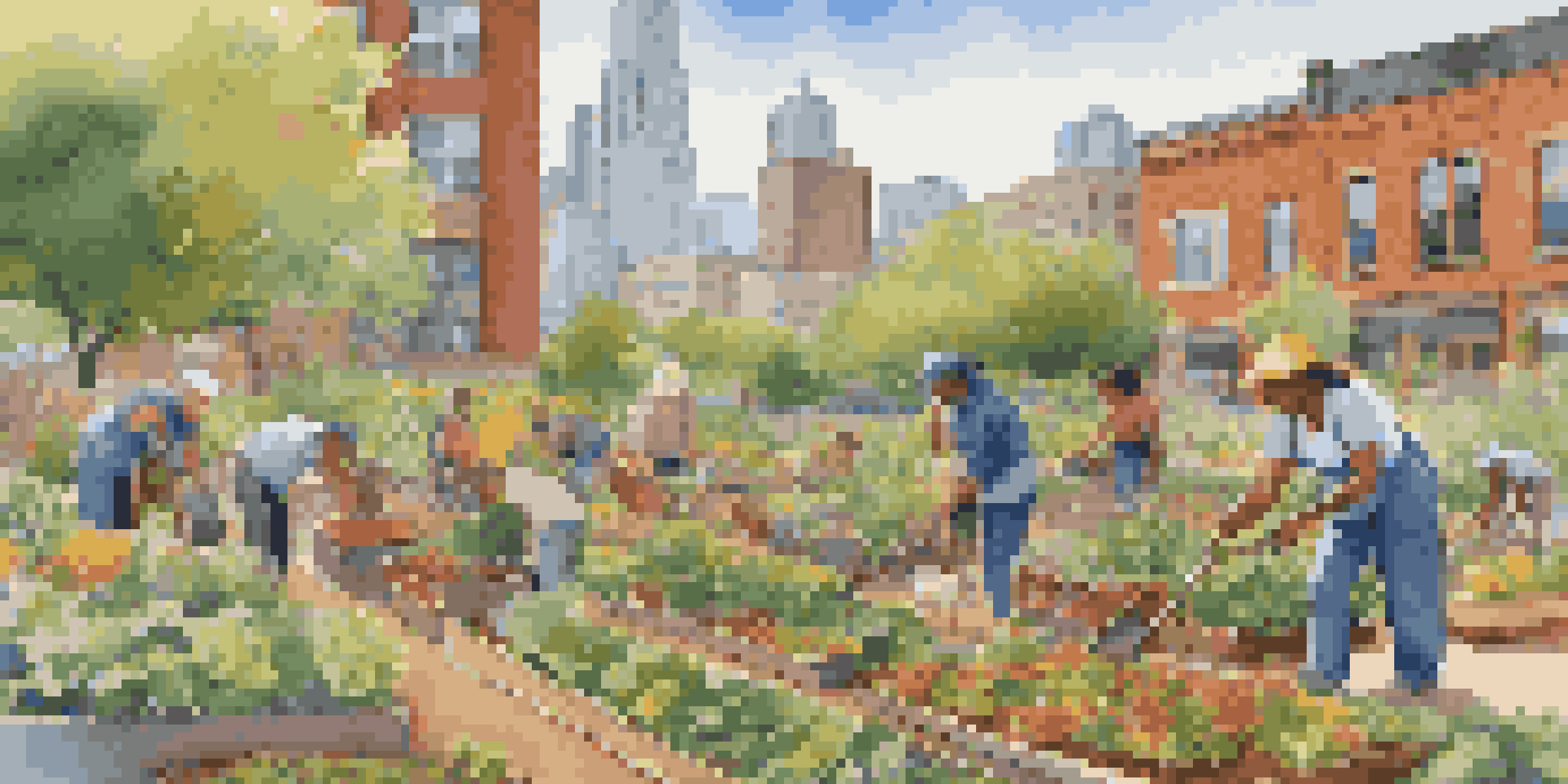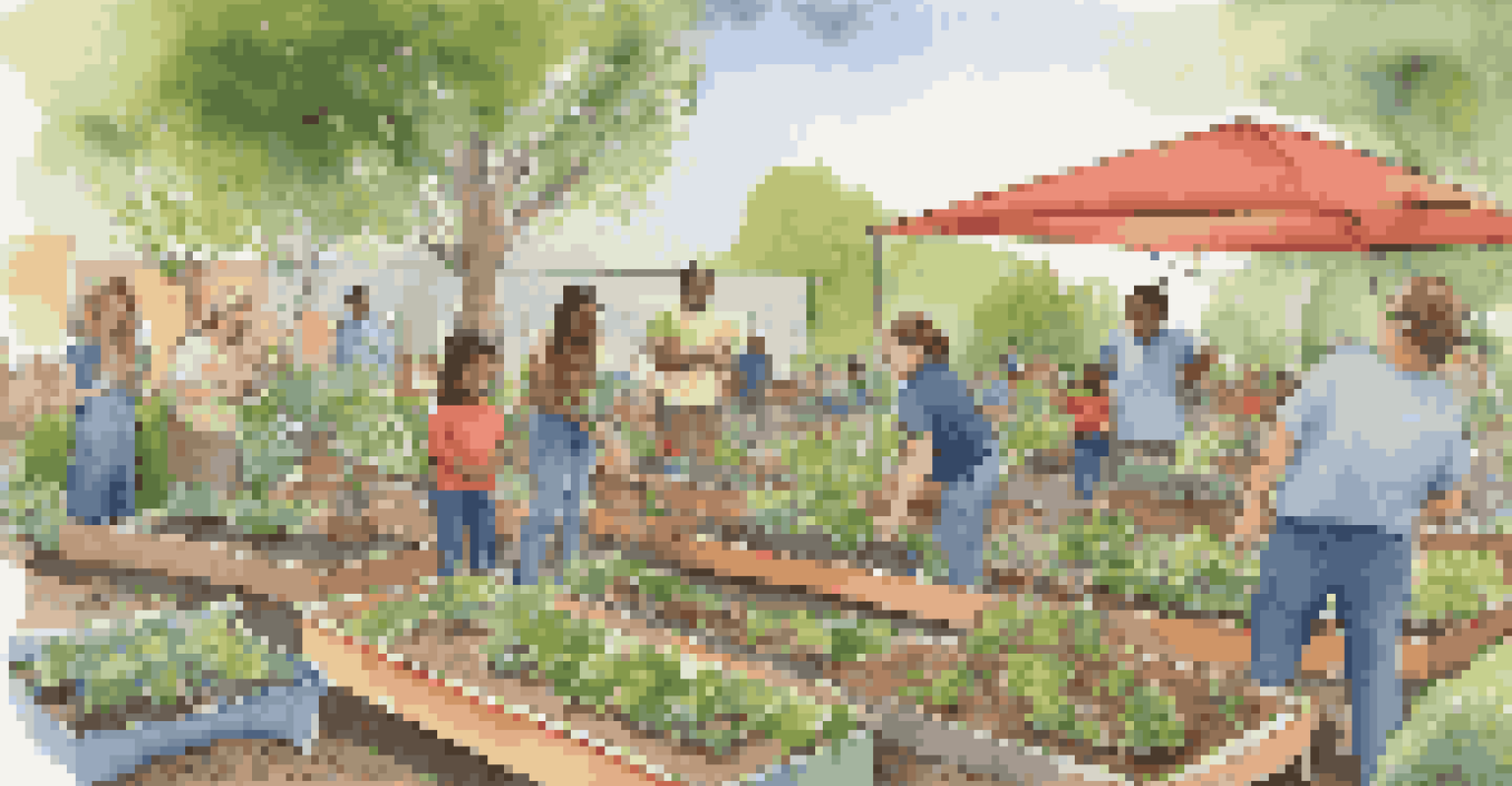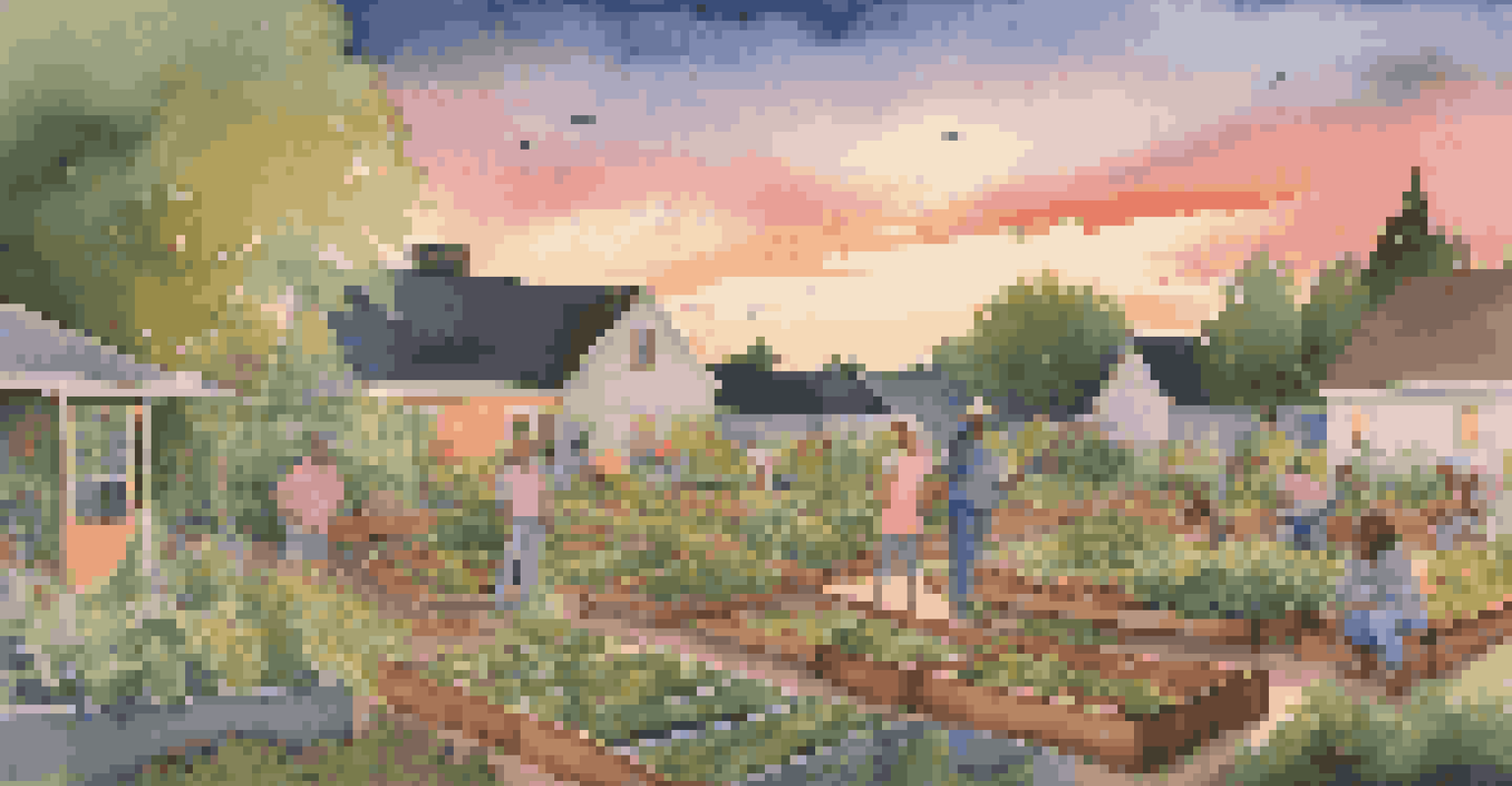Utilizing Community Gardens to Combat Urban Health Issues

The Rise of Urban Health Issues in Our Communities
Urban areas are experiencing a surge in health issues, ranging from obesity to mental health disorders. The fast-paced lifestyle, combined with limited access to fresh produce, contributes to these problems. As cities grow, so do the challenges associated with urban living, making it essential to explore innovative solutions.
The greatest threat to our planet is the belief that someone else will save it.
Many residents find themselves living in 'food deserts' where healthy options are scarce. This lack of access not only affects physical health but also has profound implications for mental well-being. When communities aren't connected to nutritious food sources, the ripple effects can be devastating.
Recognizing these challenges, cities are turning to community gardens as a potential remedy. These green spaces not only provide fresh produce but also foster social connections, making them a valuable asset in the fight against urban health issues.
What is a Community Garden and How Does It Work?
A community garden is a shared space where individuals come together to grow fruits, vegetables, and flowers. These gardens can be found in vacant lots, parks, or even rooftops, transforming underutilized areas into vibrant green spaces. Typically, community members collaborate to maintain the garden, sharing responsibilities and resources.

Participants can either rent a plot or contribute to a communal area, allowing for flexibility in how people engage with gardening. This collaborative effort fosters a sense of ownership and pride among community members. It's not just about growing food; it's about growing relationships and building community.
Urban Health Issues on the Rise
Cities are facing increasing health challenges, such as obesity and mental health disorders, due to limited access to nutritious food.
Moreover, community gardens often incorporate educational programs that teach participants about sustainable practices and nutrition. By learning how to grow their own food, individuals become more empowered to make healthier choices, thus addressing urban health concerns at their roots.
Benefits of Community Gardens for Urban Health
Community gardens offer a plethora of benefits that extend beyond just providing fresh produce. They are powerful tools for improving nutrition among urban residents, as access to homegrown fruits and vegetables encourages healthier eating habits. This shift can lead to lower rates of obesity and related health issues within the community.
Gardening is a way of showing that you believe in tomorrow.
Additionally, these gardens serve as vital spaces for mental health improvement. Studies have shown that spending time in green spaces can reduce stress and anxiety levels. When people connect with nature, even in small doses, it can foster a sense of peace and well-being, which is especially important in bustling urban environments.
Furthermore, community gardens promote social cohesion. Neighbors working together to cultivate a garden create bonds and friendships, which can alleviate feelings of isolation. This sense of community is essential for overall health, as strong social ties are linked to better mental and emotional well-being.
Community Gardens as Educational Resources
In addition to their health benefits, community gardens serve as excellent educational platforms. They provide opportunities for people of all ages to learn about gardening, nutrition, and sustainability. Workshops and events can be organized to teach essential skills, fostering a culture of health and wellness.
Children, in particular, benefit from hands-on learning experiences in the garden. When they plant seeds, tend to plants, and eventually harvest produce, it instills a sense of responsibility and connection to their food. This not only promotes healthy eating habits but also encourages environmental stewardship.
Community Gardens Promote Well-being
These shared spaces not only provide fresh produce but also enhance social cohesion and mental health among urban residents.
Moreover, these gardens can host programs that address broader health topics, such as cooking classes or nutrition workshops. By equipping community members with knowledge and skills, gardens empower individuals to make informed choices that enhance their overall well-being.
Overcoming Barriers to Community Gardening
While community gardens offer numerous advantages, there are also challenges to consider. Limited space, zoning regulations, and lack of funding can hinder the establishment of these green spaces. It's essential for communities to advocate for policies that support urban gardening initiatives and create opportunities for collaboration.
Additionally, engaging diverse community members is crucial for the success of a garden. Ensuring inclusivity helps to address any cultural barriers and brings together a variety of perspectives and gardening practices. This diversity not only enriches the gardening experience but also strengthens community bonds.
Finally, ongoing support and resources from local organizations can help sustain community gardens. By providing access to tools, seeds, and educational materials, communities can ensure their gardens flourish and continue to serve as valuable assets in addressing urban health issues.
Success Stories: Community Gardens Making a Difference
Across the globe, community gardens have emerged as beacons of hope for urban health. For instance, the Incredible Edible movement in Todmorden, England, transformed the town into a food-producing landscape, engaging residents in growing and sharing food. This initiative not only improved access to fresh produce but also fostered a strong sense of community.
Closer to home, cities like Detroit have revitalized neighborhoods through urban gardening projects. These initiatives not only combat food insecurity but also provide a platform for residents to connect, learn, and thrive. The impact of these gardens extends beyond the physical produce; they cultivate resilience and community spirit.
Education Through Gardening
Community gardens serve as valuable educational platforms, teaching individuals about nutrition, sustainability, and healthy living.
These success stories highlight that community gardens are more than just patches of green; they are transformative spaces that address urban health challenges while fostering social connections. By sharing these stories, other communities can draw inspiration and take action toward creating their own thriving gardens.
Getting Involved: How You Can Support Community Gardens
If you're inspired to make a difference, there are several ways you can support community gardens in your area. Whether you're interested in volunteering your time, donating resources, or simply spreading the word, every little bit helps. Local gardens often welcome volunteers to assist with planting, maintenance, and educational programs.
You can also participate by joining a community garden in your neighborhood. Becoming a member allows you to grow your own produce while connecting with others who share similar interests. This involvement not only contributes to your health but also strengthens community ties.

Lastly, advocating for community gardens by engaging with local policymakers can create a lasting impact. By supporting policies that promote urban agriculture, you help pave the way for healthier, more sustainable communities. Together, we can cultivate a healthier future, one garden at a time.